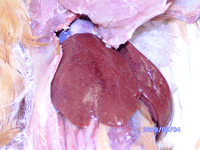Spotty liver on the increase

Vets have been reporting an increase in the incidence of “spotty liver syndrome” in laying hens since the autumn, with affected flocks suffering abnormally high mortality.
“Normally, we only see one case every four or five months, but from September through to December we have been seeing a couple every month,” Sara Perez of Minster Veterinary Practice told Poultry World.
“The primary cause of the syndrome is not well understood; the birds die suddenly, without clinical symptoms, and egg production and egg quality are not normally affected.”
Ms Perez explained that post-mortem examinations of the dead birds – typically between 25 and 35 weeks of age – revealed a range of abnormalities, including the presence of peritonitis, perihepatitis and pericarditis.
“The livers also presented with round, spotty lesions and in one case there were high numbers of Ascaridia worms in the intestine,” she said.
Bacteriology revealed abundant growth of E coli and in one case Pasteurella haemolytica and Enterococcus faecium; however, it is suspected that Campylobacter jejuni could also have been contributing to the syndrome.
“Antibiotic and worm treatments have proven to be effective in the control of this syndrome, which suggests that bacteria and worms contribute or predispose to the condition,” Ms Perez explained. “The syndrome has also been more frequent in flocks where the birds have access to contaminated water.”
Autogenous vaccines based on bivalent E coli and C jejuni antigens had helped some producers contain the condition, though monovalent C jejuni vaccines do not appear to be so effective.
Mr Perez believed the recent increase in spotty liver could be weather-related, following the high summer temperatures, and advised producers to worm regularly, avoid stagnant water and contact the vet at the first sign of increased mortality.
